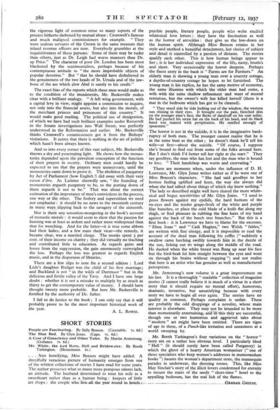SHORT STORIES
A Case of Conscience and Other Tales. By Martin Armstrong. (Gollancz. 7s• 6d.) Mr. White, the hed Barn, Hell and Bridewater. By Booth Tarkington. (Heinemann. 6s.)
. . . AND horrifying, Miss Benson might have added. A dreadfully veracious picture of humanity emerges from One of the wittiest collections of stories I have read for some years.
The author possesses what so many more pompous talents lack, an attitude. The husband determined to treat his wife as a
sweetheart rather than as a human being : keepers of little art shops : the couple who,iiiii,alLthe-yeet
psychic people, literary people, people who write studied whimsical love letters they have the fascination as well as the horror of atrocities : they give us the low-down on the human spirit. Although Miss - Benson retains in her style- and method a beautiful detachment, her choice of subject and ;detail is cOntrolled by a passion of distaste. The stories qualify each other. This is how human beings appear to
her ; her individual expression. of the lifer nasty, brutish and -short. Very occasionally the horror deepens. Perhaps the finest story_ in the book is " Farnis are for ,Parrners." An elderly man is showing a young man over a country cottage, a depths-of-country cottage he hopes to let furnished. The young man is his replica, he has the same motive of economy, the same -illusions with di Which 'the -Older man had come, a wife. .with - the same shallow. refinement -and . want of mental resources, but the- owner's wife has killed herself (there is a
mat in the bedroom Whichbasgot to be cleaned).
" They stood side by 'side looking out of the "window, the western sun shining in their eyes. It brought out the .pale, blotched skin on the younger man's face; the' flecks of dandrtiff on his coat collar. He had pushed his straw hat on the back of his head, and its black , band was stained with:perspiration. He smelled strongly of spearmint."
. The-horror is not in the suicide, it is in the imaginative bank- ' ruptcy of both men: - The younger cannot realise that he is
in the same boat as the other ; he doesif t_think he'll tell his wife—at first—about the . suicide. " Of course, I suppose she's: bound to find out from some of the folks around here.
But I don't think I'd better tell her right at the start." They say goodbye, the man Who has lost and the man who is bound
to lose. " Their-handclasp was warm and enervating."
There are moments when,- under the influence of D. H. Lawrence, Mr. Glyn Jones writes rather as if he were one of Miss Benson's_ characters.: " She -had said , goodbye to her hostess feeling uplifted and keen, the way- she always did when she had talked about thingi of which she knew nothing." The lady so described might well have shared the more whim-
sical and bogus sensitivities' of -Mr: Glyn Jones. " I used to press flowers against my eyelids, the hard buttons of the
ox-eyes and the tender grape-froth of the white and purple lilac bunches, or place the cold blade of a knife flat along my thigh, or find pleasure in rubbing the fine hairs of my hand against the back of the beech tree branches." But this is a first book : it is Lawrence we have to blame for the excesses.
" Ebert Isaac " and' Cacli Hughes," two Welsh " fables," are written with fine' energy, and it is impossible to read the account of the dead man following his coffin (" suddenly a swallow came lurching -swiftly towards him in the dazzle of the sun, licking out its wings along the middle of the road.
He ducked when-the white breast was_flutig up near his face but the bird-beak hit him straight between the eyes and went on through- his brains without stopping ") and not realise
that here is an artist who has genuine as well as manufactured perceptions.
Mr. Armstrong's new volume is a great improvement on his last. It is a thoroughly " readable " collection of magazine stories (I cannot really believe it is much of a virtue in a short story that it should require no mental effort), humorous, dramatic, inventive, but unsatisfying because with every story we have to begin all over again. The stories have no quality in common. Perhaps complaint is unfair. These are probably the odd droppings of a novelist, whose main
interest is elsewhere. They may not be intended to be more than momentarily entertaining, axial Ti this they are successful, though one or two humorous and aggrieved tales about " modern " art might have been omitted. There are signs
of age in these, of a Punch-like irritation and uneasiness at a world sweeping by.
Mr. Booth Tarkington's four -variations on the " horror " Story are on a rather less obvious level. I particularly liked " Hell ". (it should surely have been called Purgatory) in which the ghost of a hearty American womaniser (" one of
those specialists who keep women's addresses in memorandum books ") haunts the woman's department store, the mannequin parades in underwear, the dressing rooms. This, like Miss May Sinclair's story of the illicit lovers condemned for eternity to mount the stairs of the seedy " short-time " hotel to the appalling bedroom, has the real lick of the flames.
GRARAK_PREENE.














































 Previous page
Previous page